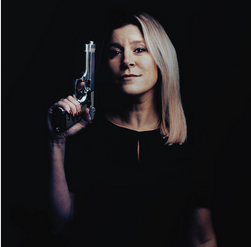 GRAHAM Smith and Robert Brydges decided that it was time for Amateur Players of Sherborne to tackle an Ibsen play, after 91 years without a single work from the great Norwegian playwright. So they set about adapting the much-performed story, focussing on its timeless qualities and modern relevances, and their new version is on stage at the Studio Theatre until 29th March.
GRAHAM Smith and Robert Brydges decided that it was time for Amateur Players of Sherborne to tackle an Ibsen play, after 91 years without a single work from the great Norwegian playwright. So they set about adapting the much-performed story, focussing on its timeless qualities and modern relevances, and their new version is on stage at the Studio Theatre until 29th March.
Set in an apartment furnished in the modern Scandinavian way, it brings the audience in the intimate theatre into the action, as Hedda, daughter of a general and new wife of loveable but research-obsessed academic Jorgen, faces the reality of her future, and sees it as impossible.
Various “modern” adaptations of the classic play have emerged in recent years, but none that I have seen has shone this particular light on the story, and that is partly helped by the direction (again by Graham Smith) and the insightful and heartfelt performances of this deeply talented cast.
It could be argued that Hedda, known as one of the great female stage roles, is the easiest part to play. She is uncompromisingly selfish and wilful. These days, she would be described as a classic narcissist, and certainly a woman with mental health issues. Her enduring fame has come from her positioning as a woman trapped by societal constraints and a fear of scandal.
Sarah Nias’s Hedda, at APS, is a woman brought up to believe she is better than those around her, and must uphold her father’s expectations. But she has a deep and wide wild streak and a desire for passionate expression, enabled by her glamour and charisma. She has already ditched a young lover, frightened of being tainted with his bad ways, and is now playing her besotted husband like a cat with a mouse.
Arriving back from a lengthy, and very boring, honeymoon, she realises that her husband’s promised promotion (and the money that goes with it) are in jeopardy, and she is in inescapable hock to the suave, lascivious and controlling Judge Brack (Robert Brydges). When her old lover returns and turns out to possess the genius and flair that her husband lacks, she sets her course on destruction.
Hedda Gabler is a play that makes you cringe – for the loyal maid Berthe (Fiona Holt), the devoted aunt Juliana (Sally Matthews) and the dedicated Thea (Mary Flanagan) – all of them used and abused by Hedda’s cruel indifference. The director has made sure that these women are more than props for the central character, and all three give memorable performances. Mary Flanagan makes the lovelorn Thea a truly pathetic figure, rather than the weak fool that often seems her lot on stage. Equally moving is Alex Scrivenor’s Eilert, a lost soul who cannot resist the vicious challenges of the woman he still loves, but, as always, gets it wrong.
This Hedda Gabler is a thought-provoking reading of a familiar story, and a credit to all involved.
GP-W